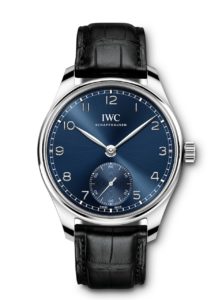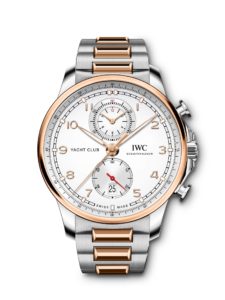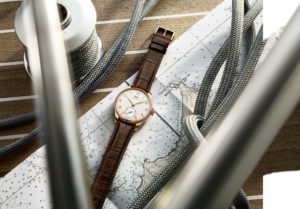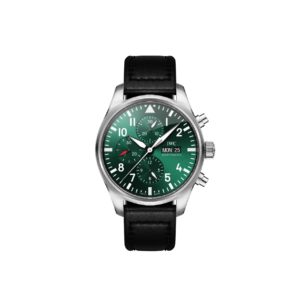By definition, luxury watches are one of the most sustainable products consumers can own today.

These handcrafted mechanisms are passed down through generations and can keep working for hundreds of years. However, the manufacturing process around luxury watches has been a topic of concern in recent times with many brands starting to assess their environmental impact and the ways in which they can tweak their processes to redefine the industry in a more sustainable way. At IWC Schaffhausen, sustainability is at the forefront of the business.
With the recent creation of the Sustainability Committee, issues and questions surrounding the topic have become even more crucial to the brand. Chief Marketing Officer Franziska Gsell has been head of IWC Schaffhausen’s Marketing & Communication department since 2015, but she has recently diversified her role to also become Chair of IWC’s Sustainability Committee. This has seen her play a key roll in the planning towards a more sustainable future at the brand. Most recently, Gsell hosted a virtual conversation with actress Cate Blanchett following the release of IWC Schaffhausen’s second sustainability report. The two discussed sustainability, its environmental and social impact and how it has become a leader in sustainable luxury watchmaking. To find out more about that conversation and continuing it throughout the future of the watchmaker we talk to Franziska Gsell.
How have you been keeping in touch with your clients throughout this strange time?
When most European countries went into lockdown, we wanted to do something special to stay in touch with people around the world. So we created the “TIME WELL SHARED” initiative, using our digital channels to keep the IWC family connected and engaged. Through this initiative, we have published numerous videos from IWC brand ambassadors and partners. The series has seen contributions from Tom Brady, Sean Fitzpatrick, Hani Rashid and many more. A particular highlight was also a series of uplifting readings from Antoine de Saint-Exupéry’s famous novel “Le Petit Prince”. Started by Indian actress Sonam Kapoor, subsequent chapters were read by others including Lebanese-British TV presenter Raya Abirached and Tunisian actress Hend Sabri.

IWC Manufacture
What has been the reaction to these virtual sessions and how has this enabled you to enhance the customer experience?
Because of the global pandemic, we had to shift many of our activities to digital channels. In no time at all, we created a digital edition of Watches & Wonders and the format worked exceptionally well. We were able to share the launch of our new Portugieser collection with an even larger number of watch lovers around the world. Thanks to innovative digital tools like augmented reality, the virtual launch was highly captivating and successful. Just recently, we held a digital launch event for our new Pilot’s Watch Chronograph Top Gun Edition “SFTI”, the first in an upcoming series of IWC Top Gun watches based on our US Navy exclusive professional watches. We have several other digital projects in the pipeline, such as virtual tours of our manufacturing centre, which will be launched shortly.
What can you tell us about sustainability at IWC and its importance to the brand?
Sustainability is at the heart of what we do as manufacturers of luxury, mechanical watches. If properly taken care of, a mechanical watch will last for generations – some of our watches are still ticking after 150 years. We aim to honour the inherent sustainability of our watches by producing them responsibly and taking good care of our social and environmental impact. We want to add value to society and leave a positive legacy for future generations.

Can you tell us a little about the sustainability committee at IWC and why as a company you felt it was important to introduce this?
Our Sustainability Committee is the driving force for ensuring our impacts are managed responsibly. The Committee, which meets quarterly, is made up of representatives who manage every aspect of IWC’s business, and together with our CEO, the Committee sets the organisation’s sustainability targets and activities. By having accountability for responsible management of our impact we can ensure our goals are practical and can be implemented as part of our regular business.
How do you think your approach is different from other brands?
In our sector, we differ because of the transparency we offer regarding our sustainability approach. By reporting to GRI (Global Reporting Initiative) standards, we enable a dialogue with our stakeholders and therefore can receive meaningful feedback. We can take steps to ensure our activities are understood and we can learn and adapt as well as always being open to opportunities to improve.
We know that by definition watches are sustainable thanks to their longevity, but how is IWC increasing sustainability around the product in areas such as packaging and distribution?
As one of our 2020 targets, we redesigned our watch boxes to reduce the average volume and weight of primary packaging by 30 per cent compared to 2017. This had the benefit of reducing emissions from shipping and logistics, but also represented a change in approach to our packaging. By designing smaller, higher-quality packaging, we created a new product, intended to be kept for generations. The new travel pouch contains 90% less plastic than previously, and 80% of the plastic remaining is recycled plastic. We aim to increase this figure to 100% and to explore packaging using new materials that offer a lower environmental impact. Thanks to innovation in materials and processes, we should have more opportunities to continue to improve our impact in future.

What can you tell us about the brand’s commitment to responsible sourcing of raw materials?
We take the impact of our supply chain very seriously and make sure we know the suppliers we work with. Many of our raw materials fall within the scope of the Responsible Jewellery Council’s certification scheme. We were the first luxury watch brand to be certified to the RJC’s stringent new Code of Practices, which aims to ensure best practices in the sourcing of precious metals and precious stones. We’re also working to demonstrate the care we take in our sourcing of animal products, supporting the creation of a new standards setting organisation in this area, and taking steps towards greater traceability. We have confidence in the practices of our suppliers and want to be able to demonstrate this to our customers.
Can you share a little on how you are using renewable energy to assist in the manufacture of IWC’s watches?
We designed our new manufacturing centre to run on renewable energy and we are encouraging our Brand Managers around the world to purchase renewable energy wherever possible. We already ensured that in 2019, we purchased only renewable electricity, globally. Energy is a topic with long roots at IWC, because our founder, F.A. Jones, chose Schaffhausen as the site of his International Watch Company in part so he could draw on water power from the River Rhine – a few steps from where I am sitting today. It’s one of the easiest ways to manage our environmental impact: it makes no difference to our product but makes a significant difference to our planet.

Cate Blanchett
We saw the recent conversation you had with Cate Blanchett – how do her values and beliefs align with those of the brand?
In her private life as well as through her professional roles such as Director of The Sydney Theatre Company, Cate has demonstrated time and again that she understands the importance of managing environmental impact. She has shown that making sustainable choices is completely compatible with elegance, beauty and being outstanding in your field – all of which I think is also embodied in our watches.
What is something you would like to change in the industry moving forward?
In the industry I think opportunities to change will flow from new technologies, processes and materials that are developed and we will continue to be open to adopting these. We would also like to demonstrate more clearly that IWC is a brand that values diversity, equality and inclusion. Our employees are happy – they voted us as a great place to work in Switzerland last year and we know engagement is high. To ensure that we are truly inclusive, we have created an international council of colleagues, looking at factors such as gender, ethnicity, sexual orientation, age, and ability. I’d like the open-minded approach we bring to our product development and to managing our environmental impacts to also be reflected as much as possible in our colleagues and leadership, as well as our partners and brand ambassadors.

In this issue, we are talking about the future – in your eyes what is the future of the watchmaking industry and what is the secret to being successful in this challenging market?
The manufacturing of mechanical luxury watches represents the most exquisite craftsmanship that has survived hundreds of years. These timepieces not only combine precision engineering and timeless design, but they also have a unique emotional component that distinguishes them from most other products of our time. I am convinced that this product will be desirable and attractive even for future generations. However, the current crisis might change our behaviour towards more conscious purchasing decisions. Possibly we will ‘consume’ less and instead, invest in products that are physically and aesthetically long-lasting and represent real emotional value for us. Established brands and responsibly made products will benefit from this phenomenon and this is why I believe that IWC is in an excellent position going forward.
Even despite the circumstances of this year how important is emotional buying with your products today?
Very important. Buying a mechanical watch is always an emotional decision. You don’t need a watch to tell you the time. A mechanical watch is a beautifully designed and handcrafted object, something that touches people on an emotional level. You attach a particular story or memory to the watch you wear every day. Maybe you have received it as an inheritance, or it was a gift you gave to yourself to celebrate a milestone in your life or your career. This individual emotional component is something very few other products can offer.

Pilot’s Watch Chronograph Edition Solidarity with Beirut
We saw this touched on with the recent watch you launched in dedication to Beirut – can you tell us a little about this watch and why it was something important to the brand?
We were simply devastated when we saw the effects of the explosion in Beirut on August 4th. For this reason, we decided to partner with Nusaned, a humanitarian, community-based and volunteer organisation in Lebanon. They are a non-governmental organisation who are working tirelessly to help Beirut and its people recover from these tragic events. With their “Goods in Need” and “Roofs that Shield” programmes, they provide families with immediate aid to rebuild their destroyed homes and shops. We decided to support Nusaned through the launch of the Pilot’s Watch Chronograph Edition “Solidarity with Beirut”. The special edition timepiece features a striking deep green dial, as well as a unique back engraving of a cedar tree, as seen on Lebanon’s flag, which symbolised eternity and peace.
Can you give us an insight into what we can expect to see from the brand in the Middle East in 2021?
I can assure you that we have many exciting things in store for the Middle East in 2021, unfortunately, I can’t go into details as of now, but stay tuned!















